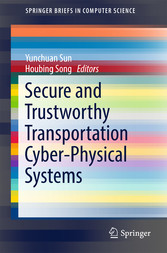Suchen und Finden
Secure and Trustworthy Transportation Cyber-Physical Systems
This book comprehensively reviews the cyber security and privacy issues in transportation cyber-physical systems (TCPSs). It examines theories and various state-of-the-art technologies and methodologies. Starting with a survey of the latest solutions in TCPSs, it introduces a smart-transport-system architecture design based on cyber-physical systems. It then discusses in detail the principles and metrics of evaluating safety and privacy in TCPSs and elaborates the verification and analysis of secure, robust and trustworthy TCPSs. Moreover, it demonstrates the advanced and novel tools commonly used in practice by several researchers. Lastly it provides an exhaustive case study on the authentication and attestation in TCPSs. This book is of interest not only to readers in the field of TCPSs, but also to those in interdisciplinary fields, such as energy, healthcare, bio-engineering etc.
Yunchuan Sun is currently an associate professor at Beijing Normal University, Beijing, China. He is an IEEE senior member and the Secretary of the IEEE Communications Society Technical Subcommittee for the Internet of Things. He is also a CCF (China Computer Federation) member and has been an associate editor of Personal and Ubiquitous Computing since 2012. He received his PhD degree from the Institute of Computing Technology, Chinese Academy of Science, Beijing China in 2009. His research interests include the Internet of Things, big data modeling and analysis, event-linked networks, semantic technologies, knowledge engineering, and information security. He has published more than 40 papers at international conferences and in journals. As one of the primary founders and program co-chairs, he has successfully organized the international IIKI series events: IIKI2012, IIKI2013, IIKI2014, and IIKI2015. He has also organized more than 10 special issues on IoT or big-data re
levant topics for several international journals. He is involved in several research projects, including NSFC, 973 and 863 and Program of China projects.
Houbing Song received the M.S. degree in civil engineering from the University of Texas, El Paso, TX, in December 2006, and the Ph.D. degree in electrical engineering from the University of Virginia, Charlottesville, VA, in August 2012. In August 2012, he joined the Department of Electrical and Computer Engineering, West Virginia University Institute of Technology, Montgomery, WV, where he is currently the Golden Bear Scholar, an Assistant Professor and the Founding Director of both the Security and Optimization for Networked Globe Laboratory (SONG Lab), and West Virginia Center of Excellence for Cyber-Physical Systems sponsored by West Virginia Higher Education Policy Commission. In 2007 he was an Engineering Research Associate with the Texas A&M Transportation Institute. He
is an editor of four books, including Cyber-Physical Systems: Foundations, Principles and Applications, Boston, MA: Academic Press (Elsevier), 2016, Security and Privacy in Cyber-Physical Systems: Foundations, Principles and Applications, Chichester, UK: Wiley-IEEE Press, 2017, Smart Cities: Foundations, Principles and Applications, Hoboken, NJ: Wiley, 2017, and Industrial Internet of Things: Cybermanufacturing Systems, Cham, Switzerland: Springer, 2017. He is the author of more than 100 articles. His research interests include cyber-physical systems, internet of things, cloud computing, big data analytics, connected vehicle, wireless communications and networking, and optical communications and networking. Dr. Song is a senior member of IEEE and a member of ACM. Dr. Song was the very first recipient of the Golden Bear Scholar Award, the highest faculty research award at West Virginia University Institute of Technology (WVU Tech), in 2016.
Alle Preise verstehen sich inklusive der gesetzlichen MwSt.







